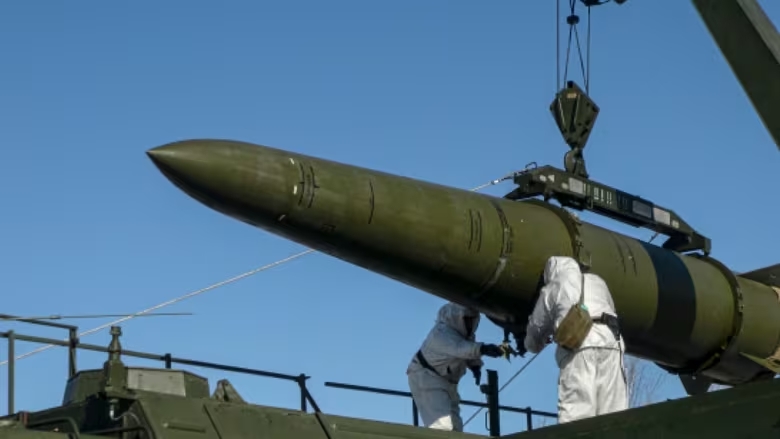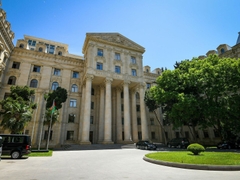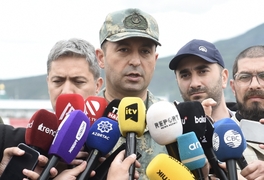Russia is set to conduct military exercises to practice the preparation and deployment for use of tactical nuclear weapons in response to the “provocative statements” made by top European officials pledging stronger military support for Ukraine, the Defence Ministry stated on Monday.
The exercise aims to “increase the readiness of non-strategic nuclear forces to carry out combat tasks,” a statement on the ministry’s Telegram channel said, noting that the order comes from President Vladimir Putin.
Tactical nuclear weapons include various arms such as air bombs, warheads for short-range missiles, and artillery munitions, designed for deployment on a battlefield, in contrast to the more powerful strategic weapons — massive warheads that arm intercontinental ballistic missiles and are intended to obliterate entire cities.
The maneuvers are expected to include missile units from the Southern Military District, alongside the participation of the air force and navy.
The Defense Ministry stated that the decision to conduct these drills is in direct response to what it deems as "provocative statements and threats" from certain Western officials directed towards Russia.
The announcement came amid discussions among Ukraine's Western allies about potentially deepening their involvement in the ongoing conflict.
Last week, French President Emmanuel Macron suggested the possibility of deploying troops to Ukraine, while UK Foreign Secretary David Cameron mentioned the provision of long-range weapons to Ukrainian forces for striking targets within Russia. Some other NATO countries providing weapons to Kyiv have balked at that possibility.
These statements, deemed as dangerous by the Kremlin, have further strained relations between Russia and the NATO.
Kremlin spokesman Dmitry Peskov described the recent statements by Macron, Cameron, and other Western officials as a "new round of escalation."
“It’s unprecedented and requires special attention and special measures,” Peskov said.
Russia's Foreign Ministry summoned the French and British ambassadors, cautioning against the potential catastrophic consequences of their countries' actions.
Russian authorities have repeatedly voiced their opposition to the Western nations providing military assistance to Ukraine, arguing that such aid not only exacerbates the conflict but also heightens the risk of a direct confrontation between Russia and NATO powers. Moreover, Moscow has long accused the West of provoking conflicts through NATO expansion and the deployment of weapon systems in proximity to Russian territories.
Russia has made it clear that any attack on its territory could provoke a nuclear response. President Putin, who governs the world’s largest nuclear power, hinted at the possibility of using nuclear weapons at the beginning of what he calls a “special military operation” in Ukraine, warning that Western interference would result in “unprecedented consequences.”
Shortly after announcing the “military operation” in Ukraine, Putin ordered the country’s nuclear deterrence forces to be on high alert, raising concerns about a potential nuclear war. The move drew strong condemnation from the United States, the world’s second-largest nuclear power, where Putin’s order was described as “totally unacceptable.”
Russia possesses the largest stockpile of nuclear weapons in the world, estimated at 6,257 warheads. Moscow retains the right to use nuclear weapons in two scenarios: in response to a nuclear attack or the use of weapons of mass destruction against Russia or its allies, or if the existence of the Russian state is threatened.







 Turkmenistan's Foreign Minister Rashit Meredow and EU's Special Representative for Central Asia Terhi Hakala have discussed prospects for cooperati...
Turkmenistan's Foreign Minister Rashit Meredow and EU's Special Representative for Central Asia Terhi Hakala have discussed prospects for cooperati...
 In a high-profile trial that has gripped the nation, Kuandyk Bishimbayev, Kazakhstan’s former economy minister, has been sentenced to 24 years in p...
In a high-profile trial that has gripped the nation, Kuandyk Bishimbayev, Kazakhstan’s former economy minister, has been sentenced to 24 years in p...
 Foreign Minister of Azerbaijan Jeyhun Bayramov met with his Armenian counterpart Ararat Mirzoyan in Almaty, Kazakhstan, to negotiate the peace agenda.
Foreign Minister of Azerbaijan Jeyhun Bayramov met with his Armenian counterpart Ararat Mirzoyan in Almaty, Kazakhstan, to negotiate the peace agenda.
 Russia is moving forward with what it calls a “special military operation” in Ukraine with its forces advancing in the Kharkiv region.
Russia is moving forward with what it calls a “special military operation” in Ukraine with its forces advancing in the Kharkiv region.



